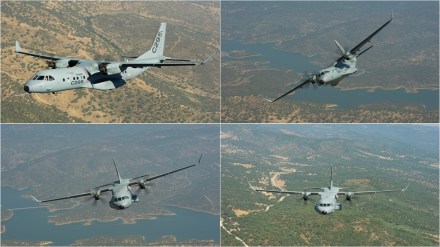In a major step forward for India’s defence and aviation sectors, Prime Minister Narendra Modi and Spanish Prime Minister Pedro Sanchez are set to inaugurate the Final Assembly Line (FAL) for the C295 aircraft in Vadodara on early Monday morning (Oct 28, 2024). This ambitious Tata-Airbus partnership, valued at $2.5 billion, stands as a key example of India’s “Make in India” initiative. It not only addresses the Indian Air Force’s immediate needs but also opens doors to long-term collaborations in aviation and defence manufacturing.
Strengthening India’s Defence with C295 Aircraft
India’s acquisition of the Airbus C295 aircraft was first formalized in 2021 as a move to replace the aging AVRO fleet in service with the Indian Air Force (IAF). The contract, signed with Airbus Defence & Space, committed to delivering 56 C295s, of which 40 will be assembled locally in India. This contract makes India the largest C295 operator worldwide, marking a significant moment in both India’s defence expansion and Airbus’ operations.
The C295 aircraft is designed for versatile roles, from transporting troops to conducting medevac missions. Its ability to operate on shorter, less-developed airstrips provides a strategic advantage for the IAF, allowing for operations in remote areas where heavier aircraft cannot reach. During the COVID-19 crisis, the C295’s versatility was demonstrated in several medevac missions, showcasing its adaptability in critical situations.
Inside the Tata-Airbus Collaboration: A New Era for Indian Aerospace
Under this contract, Airbus will first deliver 16 C295 aircraft in a “fly-away” condition from its assembly line in Seville, Spain. These initial units will establish a foundation of operational familiarity for the IAF before Tata Advanced Systems Ltd (TASL) begins producing the remaining 40 aircraft in India. This collaboration between TASL and Airbus is the first of its kind in India’s private aerospace sector, involving every stage of aircraft assembly and lifecycle maintenance.
The Vadodara assembly plant is designed to roll out its first fully India-made C295 aircraft by 2026, with a target to deliver the 56th unit by 2031. For the plant’s production, components will be manufactured at TASL’s Main Constituent Assembly (MCA) facility in Hyderabad and then transported to Vadodara for final assembly. This setup ensures an ecosystem of localized production, assembly, and support, creating a self-sustaining model that strengthens India’s aerospace capabilities.
Industrial and Economic Impact
This initiative is a transformative one for India’s aerospace industry, introducing a supply chain that incorporates both private and public sector entities. Bharat Electronics Ltd. and Bharat Dynamics Ltd., alongside other small and medium enterprises, will contribute to various aspects of the assembly, from testing to quality assurance. The production footprint is significant, with a combined area of 44,000 square meters across assembly and constituent facilities.
Over the course of the program, TASL expects to generate more than a million hours of labor per aircraft, with the project supporting over 3,000 direct jobs and more than 15,000 indirect positions across various sites. This is aligned with India’s vision of “Atmanirbhar Bharat” or “Self-Reliant India,” aiming to minimize reliance on foreign suppliers and enhance indigenous manufacturing capabilities.
Beyond the direct economic benefits, the C295 program is establishing a long-term ecosystem for aircraft maintenance, repair, and overhaul (MRO), ensuring support for IAF’s fleet over the next 25 years. This facility is also expected to pave the way for potential future variants of the C295, which could be adapted for roles in the Indian Navy and Coast Guard, with preliminary discussions on these possibilities already in advanced stages.
Infrastructure and Training for a Self-Reliant India
A crucial part of this program is the establishment of a central stock-holding depot for spare parts at the 24 Equipment Depot, Air Force Station, in Prayagraj. This depot will streamline maintenance and logistics for the C295 fleet, enabling rapid deployment and reducing potential downtime.
In addition to the production facilities, a specialized training center is being set up at the Air Force station in Agra. This center, expected to be completed by the end of 2024, will feature a full-motion simulator to provide IAF personnel with hands-on training in operating and maintaining the C295 aircraft. This setup is essential not only for the initial rollout of the fleet but also for sustaining operational readiness over the years.
The Future of Indian Aviation: Helicopter Manufacturing and Beyond
In 2023 Tata Advanced Systems’ partnership with Airbus has extended beyond the C295, recently expanding to include helicopter manufacturing. In a landmark development, TASL and Airbus announced the establishment of an H125 helicopter assembly line in India, focusing on meeting the growing demand for helicopters in civil and emergency services. The H125 facility, set to produce units for India and neighboring markets, highlights the country’s progress in becoming a regional aviation hub.
Commenting on this collaboration, Sukaran Singh, CEO and MD of Tata Advanced Systems, said, “This project aligns with the ‘Make in India’ initiative and addresses India’s growing helicopter market potential. Our partnership with Airbus enhances India’s capabilities in aviation manufacturing and supports the growth of civil aviation.”
Airbus Helicopters CEO Bruno Even noted, “India is a country with great potential for helicopters, and a locally assembled H125 will open new markets for public services, making helicopters a critical component of nation-building.”
A National Milestone in Aerospace
The Vadodara C295 plant represents more than just a production facility; it’s a symbol of India’s technological and industrial advancements. This project not only strengthens India’s defence capabilities but also signals its aspirations to be a major player in global aerospace. By fostering local production and training, India is setting the stage for an era of self-reliance and innovation in the defence sector.
